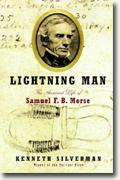Lightning Man
Kenneth Silverman
book reviews:
· general fiction
· chick lit/romance
· sci-fi/fantasy
· graphic novels
· nonfiction
· audio books
· author interviews
· children's books @
curledupkids.com
· DVD reviews @
curledupdvd.com
newsletter
win books
buy online
links
home
for authors
& publishers
for reviewers

 |
Lightning Man: The Accursed Life of Samuel F.B. Morse Kenneth Silverman Knopf Hardcover 512 pages October 2003 |
|
A modern reader will not get very far into this thorough, fact-filled biography of the inventor of the telegraph without suspecting that Morse was bipolar. This raises the question: if he'd had modern meds, would he have been a) happier, and b) less talented and driven?
He was lucky in love - initially - though his ceaseless badgering of his first wife to be truly religious must have gotten a little old and may have contributed to her early demise. He then pined away, all the while neglecting his three children who grew up with only very occasional visits from their father. Spurned by other women in several epistolary courtships, he finally married a deaf woman, whom he again criticized for not being fully a convert. Sadly, his own deaf son (and namesake) was never able to get his father's affections, and the children of his second marriage turned to bad company. One had to shipped off to Valparaiso, apparently the dumping ground for ne'er-do-wells. His second wife disappeared on a sea cruise, presumed to have tossed herself off the ship "in a temporary fit of mental aberration." These personal failures were linked to Morse's lifelong "black moods...so severe as almost to deprive me of reason..." The small dooms he continually experienced were the result of his own grandiose designs and schemes, and were a self-fulfilling recipe for misery. He was a minor painter, more a portraitist and copyist than creative artist. He did fine with small busts of the rich and famous, and made money catering to their fripperous whims. But, unsatisfied, he undertook huge canvases such as one depicting all one hundred members of the House of Congress. When he tried to put it on exhibit, only a handful of people paid to look. He sold it for a pittance. His father had been a hellfire Protestant preacher and noted geographer, and two of his brothers were innovators, so it makes sense that Morse would become an inventor. His telegraph was not so much one invention as a series of changes and modifications leading to the final product, the machine which led to his brief fame. Most practical of all was the code - the dots and dashes that facilitated writing at great speed. Morse spent much of his life in litigation over machine patents and never truly profited from his work. Again, his poor choice of business partners accounted for many of his woes, and the cutthroat nature of American business practice at the time for the rest. It's hard to feel too much sympathy for a man who preached at his wives for not being good enough and who hated immigrants, especially the Irish. He was anti-Catholic to the point of near-violence, and believed that slaves were inferior -- and that their inferiority warranted their ill treatment, a view only a very few hard-core compatriots could stomach. His invention prompted one commentator to say "this extraordinary discovery leaves no elsewhere...it is all here." It was the world wide web of its day. When he died, Wall Street closed down, and there was a day of national mourning. In the year 2003, the telegraph no longer exists as a means of communication. However, it is notable that severely handicapped persons are still able to make use of Morse's unique code, arguably his paramount creation.
|
|
|
|
 Click here to learn more about this month's sponsor! |
|
| fiction · sf/f · comic books · nonfiction · audio newsletter · free book contest · buy books online review index · links · · authors & publishers reviewers |
|
| site by ELBO Computing Resources, Inc. | |
 It is his talent and drive which spur his manic periods. From painter to photographer to inventor -- and always the entrepreneur -- Morse was filled with passions that mirrored the energy of his times. Post-Revolution, America was searching for its image and finding itself to be adventurous, competitive, and politically involved. Morse ran for office several times, never with any success, and his business failures were mostly always the fault of his poor choice of associates. Yet somehow he not only invented the telegraph and got it up and running, but he beat out the other claimants to its creation, even unto a judgment by the Supreme Court.
It is his talent and drive which spur his manic periods. From painter to photographer to inventor -- and always the entrepreneur -- Morse was filled with passions that mirrored the energy of his times. Post-Revolution, America was searching for its image and finding itself to be adventurous, competitive, and politically involved. Morse ran for office several times, never with any success, and his business failures were mostly always the fault of his poor choice of associates. Yet somehow he not only invented the telegraph and got it up and running, but he beat out the other claimants to its creation, even unto a judgment by the Supreme Court.